Wednesday
Jul 22, 1998
03:45 PM PDT
Introduction |Mid-East Rights | Legislative Activism | Direct Action & Civil Disobedience | Media Campaign
|
| |
|
| |
|
|
|

|
|

July/Aug. 1998 (1419 A.H.) - Issue #2
WHY UNSC RESOLUTION
986 DOES NOT
FULFILL THE REQUIRMENTS
FOR HUMANITARIAN
RELIEF UNDER THE UN ARTICLES
REGARDING SANCTIONS

A Presentation By
VIGIL FOR PEACE AND JUSTICE
AMGPJ
WASHINGTON, D.C.
UNITED NATIONS FOOD & AGRICULTURE ORGANIZATION'S
"SPECIAL FEATURE: OIL-FOR-FOOD DEAL: ITS IMPLICATIONS ON IRAQI'S FOOD SUPPLY POSITION"
FAO has closely monitored the food supply situation in Iraq since August 1990. Field monitoring activities were strengthened and a series of on-the-spot assessments on the food and nutrition situation in the country were carried out. FAO also participated in the various United Nations Inter-Agency Missions fielded to Iraq over the past five years. Through its Special Alerts and Reports FAO/GIEWS has continuously drawn attention of the international community to the deteriorating food supply situation and the devastating consequences of the grave food shortages afflicting the vast majority of the Iraqi population.
Concerned by the serious nutritional and health situation of the Iraqi population and by the risk of a further deterioration in this situation, the UN Security Council adopted Resolution No. 986 (1995) on 14 April 1995. This Resolution provided the basis for a fresh dialogue between the Government of Iraq and the United Nations for the resumption of limited sales of oil for the importation of food, health supplies, medicines and other basic necessities. A Memorandum of Understanding on the implementation of the above-mentioned Resolution was signed by Iraq and the UN on 20 May 1996.
The "oil-for-food" deal, which is subject to renewal, permits the sale, under certain conditions, of U.S.$ 2 billion worth of oil over a six months' period to raise money for purchasing food, medicines and other humanitarian needs. The oil sale and distribution of humanitarian supplies will be conducted under strict UN supervision which includes the monitoring of all aspects of the deal and special provision for food distribution in the three northern Governorates of Arbil, Dihouk and Suleimaniyeh. It is estimated that Iraq will be allowed to sell 750 000 to 800 000 barrels of oil per day. However, this amount will fluctuate according to international oil prices. Before the Gulf War Iraq used to pump more than 3 million barrels per day.
The UN Security Council Resolution No. 986 imposes substantial deductions from the revenue of the oil sale of U.S.$ 2 billion for war reparations, humanitarian programmes in the three northern Governorates and other UN costs, including those for the maintenance of the special commission for the elimination of weapons of mass destruction.
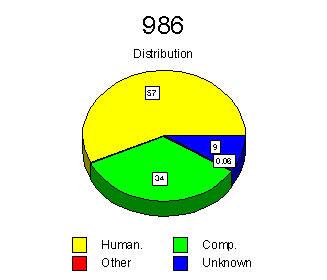
- Chart I: Distributuion Chart for capital raised by 986. Only 53% goes to humanitarian expenses-- divided between Food, Medicin, Utilities, Education and Sanitation.
The implementation of the agreement will undoubtedly alleviate the present
serious food shortage and ameliorate somewhat the nutritional and health
situation of the affected population. It will also regenerate some economic
activity and should result in a decrease in the current exorbitant food
prices and an appreciation of the Iraqi Dinar against hard currencies.
Assuming a renewal of the agreement on the same conditions for an additional
six months, the balance of funds available for one year import needs of
all humanitarian supplies (food, medicine, other basic necessities, etc.)
after the above-mentioned deductions, will be about U.S.$ 2 billion, against
the estimated
requirements of over U.S.$ 3 billion for food imports alone (see table
below).
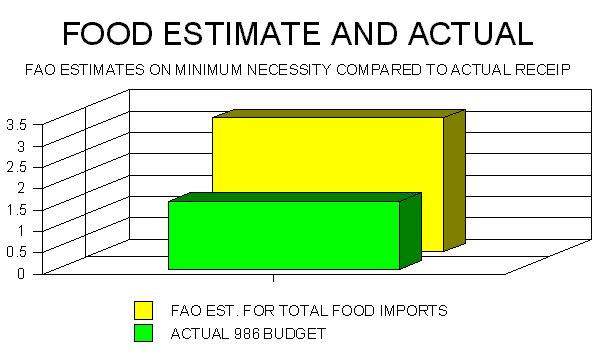
- Chart II: The FAO estimated in 1995 that it would be necessary for Iraq to import $3.126 Billion worth of food stuffs to meet basic nutritional needs in Iraq. This is supplemented with domestic production which has suffered greatly due to the UN ban on importing insecticides. In real terms under 986 the total importation of food stuffs was $ 1.6 Billion which had little effect on the suffering in Iraq. Subsequently under Resolution 1153 the import level has been doubled. However, there is no hope that this increase will seriously improve conditions in Iraq.
Why wont Resolution 986 and 1153 produce enough revenue to reverse the death toll in Iraq?
Problem #1-- distribution of resources running to thin:
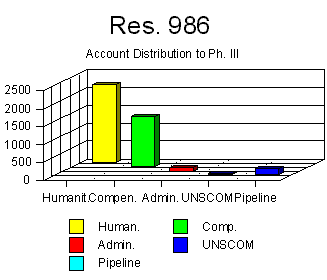
- Chart III: the distribution of revenues from 986. Only 30% of revenue goes to food relief. Only 53% of the total goes to rebuilding the devestated infrastructure of Iraq. The UN estimated in '95 that it would take $8 Billion to return Iraq to basic standards of living.
Problem #2: Humanitarian relief is divided between Food, Sanitation, Medicine, Education and Utilities. Overall, Humanitarian relief is second to Compensation to victims of Iraqs invasion of Kuwait-- the very poor continue to bleed while the very rich laugh off democracy.
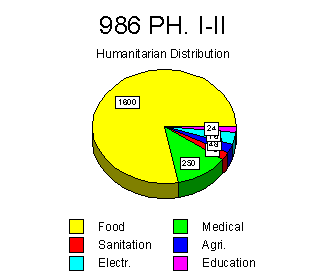
- Chart IV: Humanitarian Revenues from Resolution 986 is 53% of the total of this 53% it is divided between different sectors of which food is the largest at 57% of 53%
Problem #3: The exponential increase in fatalities in 1998 compared to 1990 would demand an even higher rate of investment than it would have in 1990. Therefore, it will be impossible for any serious reduction in fatalaties to be made given the conservative funds available for relief work.
If we look at fatalaties in the under age 5 group we discover that even after the start of the implementation of Resolution 986 that deaths increased. Even by doubling the amount that is able to be lifted from Iraq it would only, at best, maintain the previous years results based on common trends and logic.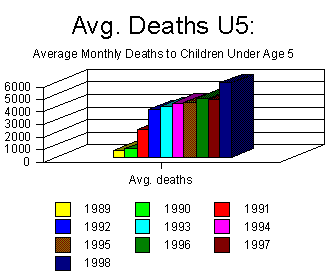
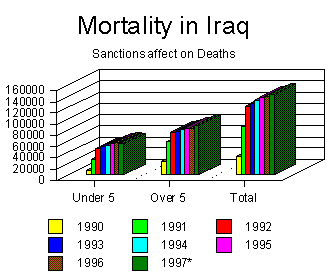
Latest Updates:
April 17, 1998-- Decrease in Funding
This means that there is NO chance of Iraq reversing the death toll in Iraq from sanctions. It is estimated that it would take at least 3.1 Billion dollars in food alone at '95 prices (not including inflation to the year '98) to meet the Food requirements alone. Resolution 1153 boosting the level of amount to be lifted from Iraq (5.26 Billion) will not be met it will only be able to produce 3 Billion. Which probably means that Resolution 1153 after inflation maintains the same levels of production as Resolution 986. During the period from '95, the year of the implementation of Resolution 986 to the present deaths of children Under Age 5 has increased to 5900 per month. Up from 742 in 1990.
I am working on a presentation rebuffing the Clinton Administration claim that Resolution 986 can meet the humanitarian clause of Resolution 661. We must definitively explain why only the end of economic sanctions can produce the desired end to Iraqi suffering.
April 19, 1998:
1996/107. Humanitarian situation in Iraq At its 21st meeting, on 20 August 1996, the Sub-Commission, recalling its decision 1995/107 of 18 August 1995 affirming the need to respect the principles of the Charter of the United Nations, the Universal Declaration of Human Rights, the International Covenants on Human Rights and the relevant provisions of the Geneva Conventions of 12 August 1949 and the two Additional Protocols thereto, recalling also the Declaration of Minimum Humanitarian Standards contained in document E/CN.4/Sub.2/1991/55, deeply concerned at reports of the serious consequences which the embargo imposed on Iraq for the past six years is having on the entire civilian population in Iraq and, in particular, on children, women and the most underprivileged sectors of the population, taking note of the agreement between Iraq and the United Nations on the implementation of Security Council resolution 986 (1995) of 14 April 1995, concerned nevertheless at reliable information according to which children will continue to die after the agreement, since it does not correspond to the minimum needs, in particular for food and medicines, of the civilian population, decided, without a vote, to appeal once again to the international community as a whole and to all Governments, including that of Iraq, to facilitate the supply of food and medicines to the civilian population.See the UN Decision of '96 and the UN Decision of '97
R e l i e f W e b
http://www.reliefweb.int
Source: UN Department of Public Information (DPI)
Date: 22 May 1998
The nutritional status of Iraqi children, more than a quarter of whom are malnourished, has failed to improve in the last year, according to a United Nations Spokesman.
Eric Falt, the Spokesman for the United Nations Humanitarian Coordinator in Iraq, said on Thursday that approximately 27 per cent of children under 5 years were still suffering from chronic malnutrition, 9 per cent from acute malnutrition and 24 per cent were underweight.
The findings were the result of a survey carried out in March by the United Nations Children's Fund (UNICEF), the World Food Programme (WFP) and Iraq's Ministry of Health. They show little improvement in the malnutrition levels of 12 months ago.
Mr. Falt expressed disappointment at the lack of substantial changes in malnutrition figures. However, he said, the survey showed that the constant deterioration of young children's nutritional status over the past seven years may have stabilized. "A complete reversal of the chronic malnutrition situation in Iraq will take years," he added.
The survey also showed that substantial improvement in the Iraqi population's nutritional status could only come with improvements in other areas, such as clean water and better sanitation, he said.
The Spokesman noted that 5 million metric tons of food had been brought into Iraq under the United Nations Oil-For-Food programme, whose benefits, he said, tend to be underestimated.
Visit the United Nations Oil-for-Food Web Site
Who Profits from Iraq's Oil-for-Food Deal?
Isn't it weird how before Resolution 1153 is implemented Saudi Arabia over-produces oil driving down the price and why are these American Corporate lawyers representing Kuwaiti corporations at the Compensation bank vault?
Where does all the relief go?

